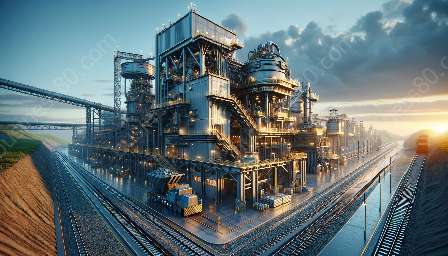Alumina refining plays a crucial role in the aluminum mining and metals & mining industries. It involves the extraction and purification of alumina from bauxite, offering essential insights into sustainable practices, technological advancements, and its impact on the global supply chain.
Understanding Alumina Refining
Alumina refining is the process of transforming bauxite ore into alumina - a key precursor for aluminum production. The process involves various stages, from mining bauxite to refining it into pure alumina, which is then utilized in the production of primary aluminum. The journey from bauxite to alumina refining involves several critical steps and technologies to ensure the purity and quality of the final product.
Key Steps in Alumina Refining
The process of alumina refining typically includes the following key steps:
- Mining and Crushing: Bauxite ore is extracted from the earth's crust and processed into a manageable size for transportation.
- Pre-treatment: The crushed bauxite is further processed to remove impurities and prepare it for the refining process.
- Bayer Process: The pre-treated bauxite undergoes the Bayer process, where it is dissolved in hot sodium hydroxide solution to produce sodium aluminate solution and impurities are filtered out.
- Alumina Precipitation: The sodium aluminate solution is then seeded with aluminum hydroxide crystals, causing the precipitation of pure alumina hydrate.
- Calcination: The alumina hydrate is then calcined at high temperatures to remove the water content, resulting in the production of pure alumina.
Technological Advancements in Alumina Refining
Advancements in technology have significantly improved the efficiency and sustainability of alumina refining. Innovations in process control, automation, and environmental management have led to reduced energy consumption, minimized waste generation, and enhanced product quality. Additionally, the integration of digital solutions and data analytics has enabled real-time monitoring and optimization of the refining processes, leading to improved productivity and cost-effectiveness.
Sustainability in Alumina Refining
Alumina refining operations are increasingly focusing on sustainable practices to minimize their environmental impact. This includes the adoption of renewable energy sources, water conservation measures, and the implementation of circular economy principles to maximize resource efficiency. Furthermore, efforts are being made to reduce greenhouse gas emissions and promote responsible waste management through recycling and reuse initiatives.
Alumina Refining in the Global Supply Chain
Alumina refining is a vital link in the global supply chain of aluminum production. The refined alumina is transported to aluminum smelters where it is electrolyzed to produce primary aluminum, which is further utilized in various industries including automotive, construction, and aerospace. The efficient and sustainable production of alumina is crucial for ensuring a stable supply of aluminum for diverse applications worldwide.
Conclusion
Alumina refining is a complex and essential process within the aluminum mining and metals & mining industries. Understanding the key steps, technological advancements, and sustainability initiatives in alumina refining is integral to driving innovation and responsible practices in the production of aluminum. By embracing sustainable refining processes and leveraging cutting-edge technologies, the industry can continue to meet the growing global demand for high-quality alumina and aluminum products while minimizing its environmental footprint.

